Event
Johnson: ‘Unrealistic expectations’ a barrier to health care reform

April 14, 2009 — At his Shorenstein Center talk, Dr. Timothy Johnson, medical editor for ABC News, didn’t hide how important he felt health care reform was for America.
“Up until about five years ago I spent almost all my time covering developments in clinical medicine — new breakthroughs,” Johnson said, addressing the standing-room-only crowd. “But somewhere along the line it dawned on me that what was really important in affecting the public’s health was changes in our health care delivery and financing system. Short of a cure for cancer, those changes would be more important than any clinical developments.”
Johnson’s talk was titled “Health Care Reform: What the Public Needs to Know,” and he started by breaking down the issue into three separate problems — “access, cost and quality” — and then provided a few facts that were no less chilling for their familiarity: 45 million Americans have no health insurance; the United States is the only industrialized country in the world that doesn’t provide universal coverage; we spend twice as much per person as other countries do on health care, but get no better results. “If we had health care that was twice as good we could maybe live with that, but we don’t,” Johnson said.
As he sees it, the biggest barrier to reform isn’t Congress or lobbyists or insurance companies, but our own demands. “We want Marcus Welby,” Johnson said, referring to the ’70s TV program about the perfect doctor. “Solved every problem within 28 minutes. Never talked about money or a bill.” Johnson said that such “unrealistic expectations” — that somehow we can all get convenient, state-of-the-art care at no cost — are ultimately going to be “the toughest nut to crack.”
As a member of the media, Johnson was open about the challenges of explaining reform to the public. He felt that how the current effort was being managed simplified things. “In the Clinton years it was behind closed doors,” he said, but not now. “We think we’ll have a better crack at the process.”
So what are the odds of meaningful reform? Johnson said that atmosphere at President Obama’s recent health care summit was filled with “cooperation and hope.” While the process won’t be easy, this won’t be a replay of the early ’90s. “You have the public a bit wiser than they were to what’s going on,” Johnson said. “Also, American business is much more worried now about paying the bills.”
This article was written by Leighton Walter Kille of the Shorenstein Center. The photo was taken by Janell Sims.